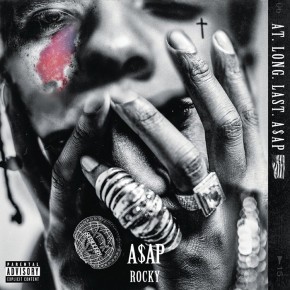A little over two years after releasing his commercially satisfying debut record Long.Live.A$AP, A$AP Rocky is back in the limelight with his trippy new sophomore album At.Long.Last.A$AP (ALLA).
For the most part, ALLA brings a somewhat hallucinatory experience for listeners by coming through with a unique mix of extravagant melodies and spaced out vibes as A$AP Rocky details the lifestyle that has coincided with his rise to fame.
In the 18 tracks offered on the feature-heavy project, the A$AP Mob leader covers a range of topics pertaining to the solace and discomfort he’s found in stardom – the sex, the drugs and the money, as well as the struggles of morality and the loss of loved ones.
It’s been a couple years since he’s entered the game, and it’s been a few months since the passing of A$AP Yams – whom the album cover art pays homage to. ALLA is essentially the canvas that A$AP Rocky uses to illustrate his current mindset with everything he’s facing.
At times the album delivers thought-provoking content, on occasion it gets a bit experimental and every so often it comes through with catchy and energetic tracks.
As a result, at times the album delivers thought-provoking content, on occasion it gets a bit experimental and every so often it comes through with catchy and energetic tracks – records which A$AP Rocky is no stranger to.
The idea of such a combination of moods and sounds on Rocky’s second major label album is quite ambitious, but its execution isn’t as consistent as one would hope.
This isn’t to say that the album would be better off if it stuck to one distinct mantra, but rather that its effort in combining the different sides of A$AP Rocky isn’t as smooth as it could’ve been. The project often feels like a mind-bending – at times confusing – drug trip unlike any other.
A$AP Rocky’s versatility on this project is one of the positives though. The Harlem emcee’s charisma on the microphone is as dope as ever and his flows are excellent, regardless of the production – which tends to vary quite a bit throughout.
While there are definitely some great records to work with, the disappointing ones that float in between can’t be ignored.
“Holy Ghost” and “Canal St.” – the album’s first two tracks – showcase this flow ability pretty well. The two songs differ quite a bit, with the former discussing Rocky’s take on religion with his newfound fame atop a rusty instrumental, and the latter being a cut illustrating the rapper’s “hustle” over a hypnotic melody.
“L$D” (also known as “Love, Sex, Dreams”) has the rapper singing about a love interest over some suitably intoxicating production, while “Excuse Me” then pops out of nowhere to wow listeners with A$AP Rocky’s captivating boastful verses over one of the album’s most lavish instrumentals.
Then later in the album, there are standout tracks like “M’$”, which features an impressive Lil Wayne verse, the awesome, beat-changing Mark Ronson, Miguel and Rod Stewart collaboration “Everyday”, and the incredibly dope “Wavybone” – which features contributions from Juicy J and Bun B, as well as a posthumous verse from rap legend Pimp C.
While there are definitely some great records to work with, the disappointing ones that float in between can’t be ignored.
Rocky’s confidence appears to be unshaken by the changes in his life, and he continues to grab attention with his originality.
The ScHoolboy Q-assisted “Electric Body” is one of the biggest letdowns – especially considering the success of the previous collabs between the two artists (see: “Hands On The Wheel”, “Brand New Guy” and “PMW”). On “Electric Body”, the experimental feel just doesn’t work and the verses leave much to be desired.
Other times on the album, it isn’t only an unusual instrumental aspect here or there taking away from a given track. Instead, it’s Rocky’s ideas being a bit too shallow to revisit. Tracks like “West Side Highway” and “Better Things” exemplify this. The verses aren’t exactly groundbreaking and the beats aren’t very memorable.
ALLA’s main flaw comes in the form of leftover tracks taking away the shine from the more refined songs that deserve it. Alongside some content that can be taken as repetitive in certain instances, filler hurts A$AP Rocky’s cause.
Still, there are many high points on this project. Rocky’s confidence appears to be unshaken by the changes in his life, and he continues to grab attention with his originality. The challenge is for him to utilize his ingenuity in a way that brings more quality than quantity next time around.




Comments are closed.